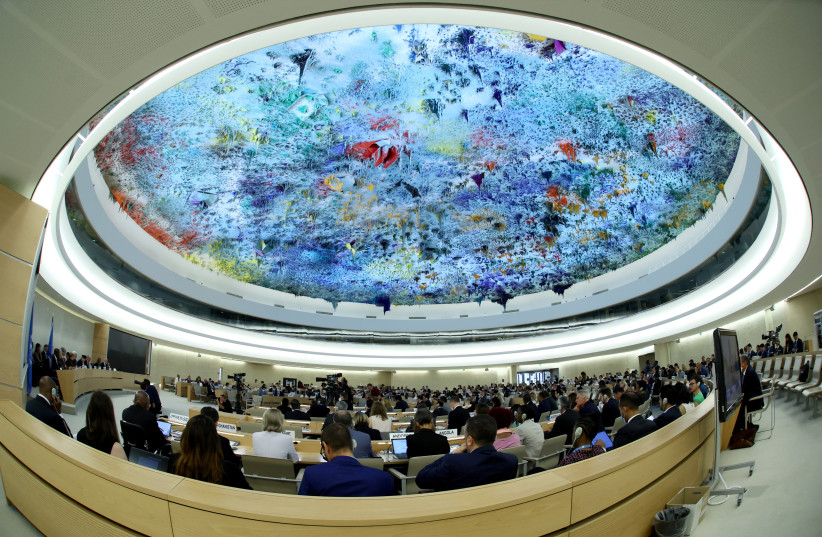The United Nations Human Rights Council on Thursday refused to tackle China’s forced imprisonment of its Muslim Uyghur minority, defeating by a narrow margin a resolution that would have mandated a debate on the matter.
The very brief resolution did not condemn China’s actions, which some countries, including the United States, have described as genocide. It simply asked that the UNHRC “hold a debate on the situation of human rights in the Xinjiang Uyghur Autonomous Region at its fifty-second session [in March 2023] under agenda item 2.”
The 47-member body rejected the US and Norwegian text in a vote of 19-17, with 11 abstentions.
Western envoys blast UNHRC vote
US Ambassador to the UN Michele Taylor said she was “disappointed” by the vote, adding that “no country should be immune from a discussion at the council.”
The US, she pledged, “will continue to work closely with our partners to seek justice and accountability for victims of human-rights abuses and violations, including the Uyghurs in Xinjiang.”

Earlier, the resolution took a neutral position on the issue, merely calling for a discussion on the matter, Taylor said.
The resolution was put forward following a report former UN high commissioner for human rights Michele Bachelet submitted to the council on the Uyghurs prior to the end of her term in August.
UK Ambassador to the UN Simon Manley issued a sharp statement against China, in which he quoted from Bachelet’s report.
“The extent of arbitrary and discriminatory detention of members of the Uyghur and other predominantly Muslim groups may constitute international crimes, in particular crimes against humanity,” he said. “These crimes include torture, sexual and gender-based violence, forced sterilizations, severe restrictions on freedom of religion and belief, and forced disappearances on a massive scale.
“And what is all the more significant is that so many of those findings are based on official public information from the Chinese authorities – corroborated by other sources.”
In light of this, a UNHRC debate is the least the council can do, Manley said.
Chinese Ambassador to the UN Chen Xu said the resolution would legitimize Bachelet’s report and was an attempt by Western countries to interfere with his country’s internal domestic affairs.
The US “is keen to point fingers at others” while ignoring their own human-rights abuses, he said. He characterized the imprisonment of the Uyghurs as an anti-terrorism operation.
To date, the council has not passed any resolution against China's forced imprisonment of the Uyghurs. In March of this year, it passed four anti-Israel and or pro-Palestinian resolutions. The UNHRC is mandated to debate alleged Israeli human rights abuses against Palestinians at every session under Agenda items 7; no other country has such a standing item leveled against it.
Israel is not a member of the council and could not vote on the China resolution.
Countries that called for a debate on the Uyghur resolution were: the Czech Republic, Finland, France, Germany, Honduras, Japan, Lithuania, Luxembourg, Marshall Islands, Montenegro, Netherlands, Paraguay, Poland, South Korea, Somalia, the UK and the US.
Countries that opposed it were: Bolivia, Cameroon, China, Cote d’Ivoire, Cuba, Eritrea, Gabon, Indonesia, Kazakhstan, Mauritania, Namibia, Nepal, Pakistan, Qatar, Senegal, Sudan, United Arab Emirates, Uzbekistan and Venezuela.
Countries that abstained were: Argentina, Armenia, Benin, Brazil, Gambia, India, Libya, Malawi, Malaysia, Mexico and Ukraine.
Israel scores victory at UNHRC
Separately, Israel scored a victory at the UNHRC on Thursday when the council unanimously approved a resolution it had proposed on cyberbullying. Israeli Ambassador to the UN Meirav Eilon Shahar read out the text of the resolution, which had 64 co-sponsors, according to the Foreign Ministry. It said this was the first time the council had approved an Israeli-led resolution.
“Israel is a member with equal rights in the UN,” Shahar said. “Despite the fact that there are countries in our region, and beyond, that would like to see Israel isolated in the international arena, we work determinedly to integrate Israel in every field at the UN.”
“Cyberbullying is a problem that every country faces, and it is a worthy issue to deal with it on a global level,” she said.
